Gen Z and AI: Research on Workplace Skills

Gen Z meets AI
Gen Z is diving headfirst into AI, using it en masse. From prepping workout and food plans to crafting job applications and using AI tutors, young adults have woven it into their lives.
But how will this tight-knit bond impact the workplace? Young adults are already criticized for lacking communication and collaboration skills. Will relying on AI tear down their social skills?
The latest TalentLMS research sheds light on these burning questions. And unveils clouds on the horizon.
Almost half (47%) of Gen Z professionals rely more on AI for guidance at work than on their managers. They say that AI offers them better support. Signaling that AI may disrupt teamwork as we know it.
“I receive better guidance at work from AI
compared to my manager.”
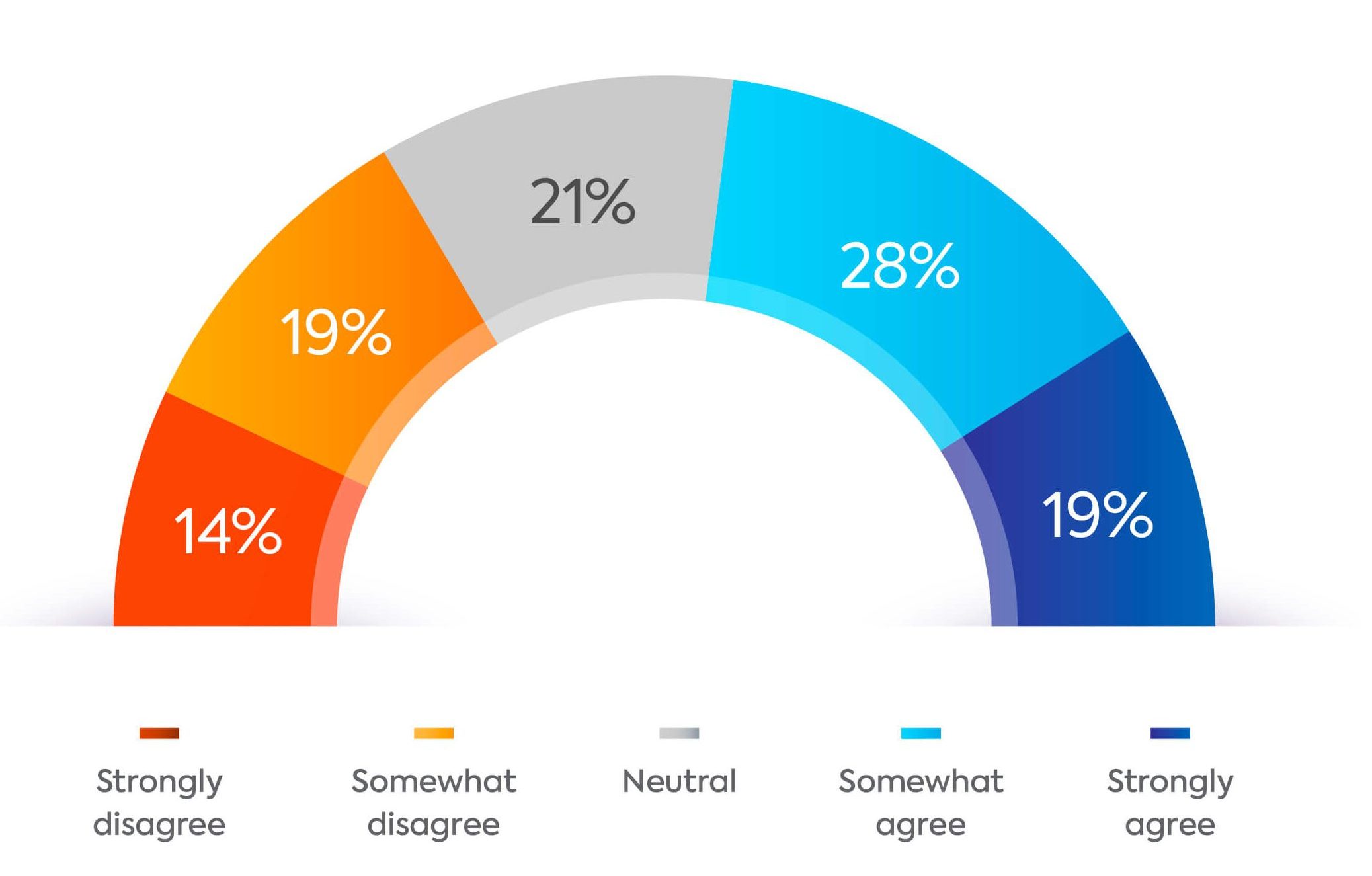
Another finding confirms this tendency. Forty-six percent of young professionals prefer to ask AI about work-related questions rather than colleagues or managers. The data points to an emerging pattern that could become a trend: When seeking support and guidance at work, the youngest workforce turns to AI over people.
46% of Gen Z employees prefer asking AI about work-related questions rather than their colleagues or managers.
This shift can put collaborative workplace dynamics, such as mentorship, teamwork, and knowledge sharing, at risk.
Gen Z’s relationship with AI is redefining workplace collaboration
Gen Z lived through major life milestones in the isolated and remote world of the pandemic years. Missing out on in-person interactions on campus and at work, they immersed themselves in screens, feeds, and technology.
So when AI showed up, they embraced it. For Gen Z, AI isn’t just a new tech tool. It’s their 24/7 sidekick, helping them navigate work and life.
But is AI changing how they relate to other people?
To gauge AI’s impact on work relationships, we asked Gen Z employees if they interact less with their colleagues because of AI. The results differed by a small margin. Forty-one percent said that using AI at work has not made them communicate less with their peers. That was encouraging to see. Yet, 39% of Gen Zers say they interact less with colleagues because of AI. That’s worrying.
4 in 10 Gen Z employees interact less with colleagues at work because of AI.
Even though they don’t appear to want it, young adults need guidance from their coworkers. AI can answer questions. But it can’t mentor them, give meaningful feedback, guide their development, or help them adapt to new environments.
Turning to AI may be easier than navigating the complex world of human relationships. But this easy fix comes at a cost. It can strip young professionals of the chance to learn how to communicate and collaborate well with others. Less time spent interacting with people will inevitably lead to underdeveloped people skills.
Despite all the advantages, AI fluency can’t bridge the communication gap.
Impact of AI on Gen Z’s skills: Supercharging skill sets
With young adults relying heavily on AI, we wanted to examine how this reflects on their skills. Is it building up their skill sets or stripping them away?
Here’s what we found.
How does using generative AI at work
impact Gen Z’s skills?
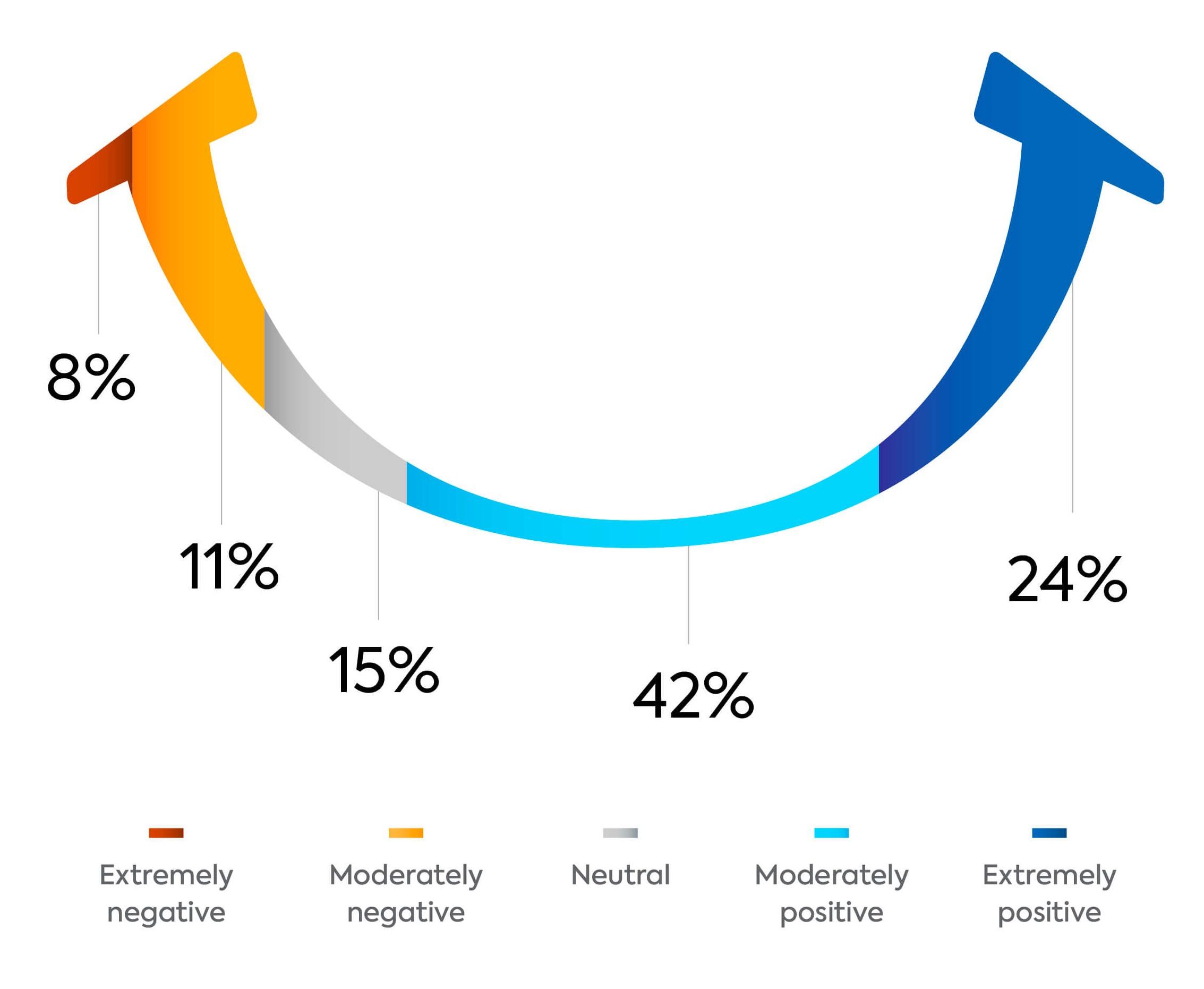
The data that came to light illustrates that AI is jazzing up the skills of young professionals. A majority (66%) of Gen Z employees say that using AI at work positively impacted their skills. At the same time, almost 2 in 10 (19%) report that using AI had a negative impact on their skills, while 15% say there’s no impact.
But what specific skills is AI boosting? From our research, hard skills emerged as the winner. Sixty-five percent of Gen Z employees found AI helpful in improving them. When it comes to soft skills, 55% found AI enhanced their soft or interpersonal skills.
65% of Gen Z employees found AI helpful in improving hard skills.
These results emphasize that AI can be a helpful ally in the professional development of the youngest workers. (As it already is for the majority.) But there’s a minority of young professionals who report that using AI has negatively affected their skills. And they need support.
So, how can employers help those who find it difficult to keep up with changes? To tackle this challenge, some companies offer additional training on teamwork and communication and more exposure to in-person activities for new hires. Other employers offer guides on writing emails and communicating with their bosses.
Let’s look at some relevant survey data shining more light on this question.
Must-have for smooth AI integration: Gen Z calls for soft skills
Our survey explored potential solutions to the challenges created by AI. So, we put soft skills in the spotlight. Can they make a difference? You bet!
Turns out, 63% of Gen Zers think that AI integration in the workplace should be accompanied by training on soft skills. And they’re onto something. Soft or interpersonal skills can be an antidote to disconnection and isolation of the digital age.
63% of Gen Zers think that AI integration in the workplace should be accompanied by training on soft skills.
These results speak of young professionals’ awareness on the mixed impact of AI. While recognizing that AI is elevating their growth and development, they’re aware of the growing communication gap.
But there’s a catch. This survey has uncovered Gen Z’s preference to interact with AI over people at work. Putting it all together, it seems that the youngest workforce understands the importance of developing soft skills. Yet don’t seem too eager to practice them.
This discrepancy is also reflected in Gen Z’s ranking of the most impactful skills we’ll see next. Turns out, interpersonal skills bottomed their list.
Skills to rule the AI era: Gen Z upvotes digital skills
We asked Gen Z to rank the most crucial skills in the AI era. Here’s how they voted.
1. Digital skills (52%)
2. Hard/technical skills (46%)
3. Cognitive skills (44%)
4. Interpersonal skills (35%)
5. Emotional intelligence skills (31%)
Gen Z demonstrated a clear preference for hard skills over human-centric abilities. Digital skills came on top, underlining their strong connection with technology. As a runner-up, the generation of digital natives picked technical skills. Their votes clearly show Gen Z’s emphasis on hard skills. Cognitive skills ranked in the upper middle, falling behind digital but close to technical skills.
Unlock your teams’ full potential with TalentLMS.
Sign up in seconds, test the platform forever, upgrade whenever.
But prioritizing hard and cognitive skills comes at the expense of soft skills.
Interpersonal skills and emotional intelligence hit the lowest ranks. Which, in light of Gen Z’s poor collaboration and communication skills, is an area of concern.
Interpersonal skills and emotional intelligence are at the bottom of Gen Z’s list.
AI can work wonders for Gen Z employees, but at the same time it throws a wrench into their development. Especially when it comes to teamwork, communication, and building workplace relationships.
After all, going incommunicado won’t help bridge the social skills gap.
How AI affects Gen Z’s learning and development at work
Our research also looked into how learning and development at work evolve. We set out to understand if AI is hindering or propelling growth opportunities for the youngest employees. The responses formed a mixed bag.
Let’s dive in.
First off, the numbers clearly show that AI fuels the workplace learning of young workers. Here’s the stat: Sixty-two percent of Gen Z employees say AI has positively impacted their learning and development at work.
Has AI impacted your
learning and development at work?
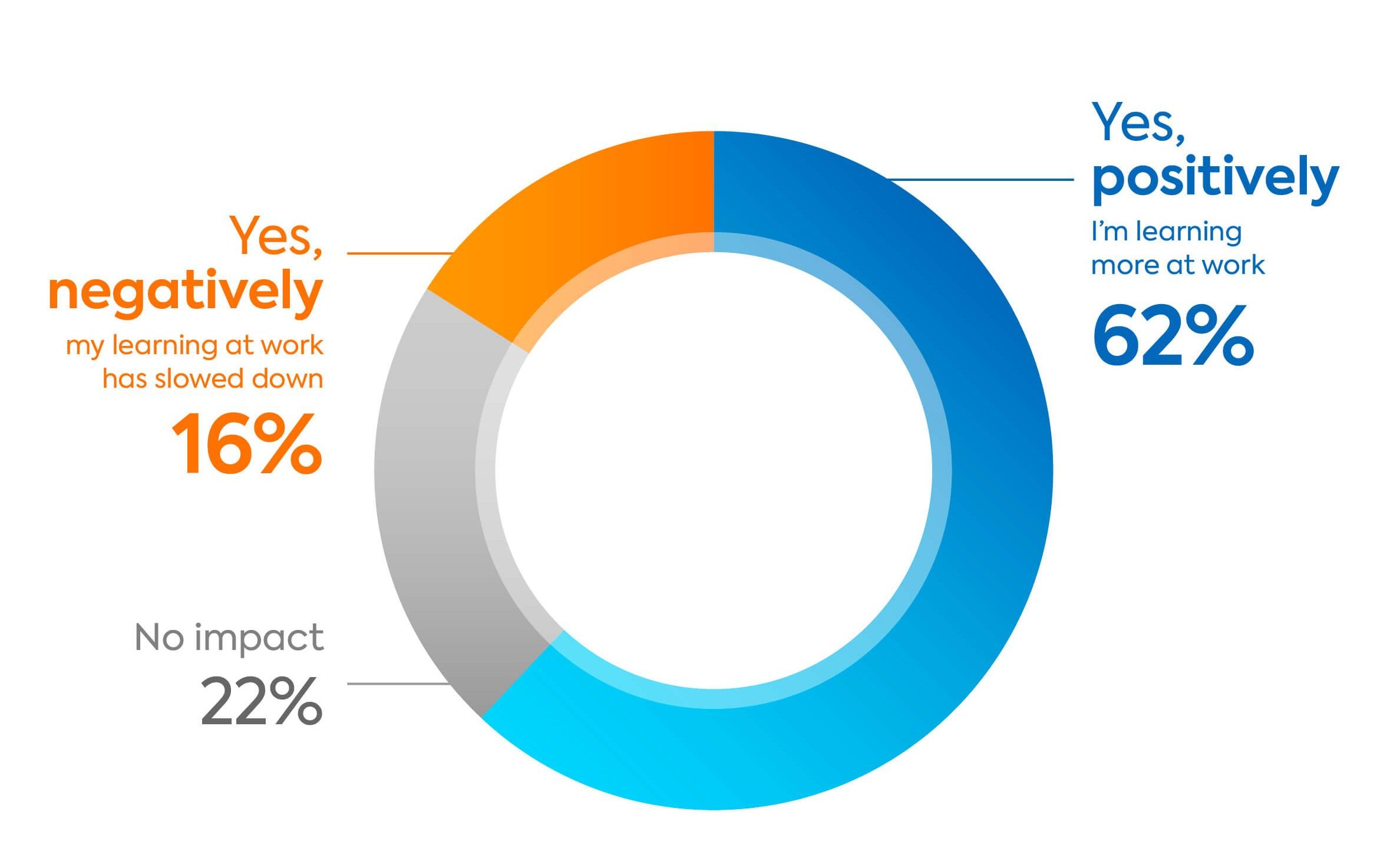
That’s a strong positive marker, signaling to employers to embrace AI in Gen Z’s workplace learning. After all, AI is breaking new ground in employee training.
66% of Gen Z employees say that using AI at work positively impacted their skills.
But what about growth opportunities from various tasks that are now delegated to AI? To explore, we asked if AI has stripped young professionals of growth opportunities. The sentiment was almost evenly split.
On the positive side, 42% say delegating tasks to AI hasn’t been an obstacle to growth.
However, there’s a flip side. Namely, 40% of Gen Z employees say AI has hindered their growth by doing tasks from which they could have learned. A large portion of young pros feel like they’re missing out on learning opportunities. Spotlighting the double-edged sword of AI efficiency.
And they’re onto something.
Just like smartphones weaken the intellect by making the brain dependent, any new tech that replaces the process of human discovery will have the same impact. Employees, especially the more inexperienced, may neglect their judgment and work on autopilot. Missing chances to develop their problem-solving and critical-thinking skills.
This raises an important question: How dependent are Gen Z employees on AI, actually?
“I am dependent on AI to complete
my daily tasks at work.”
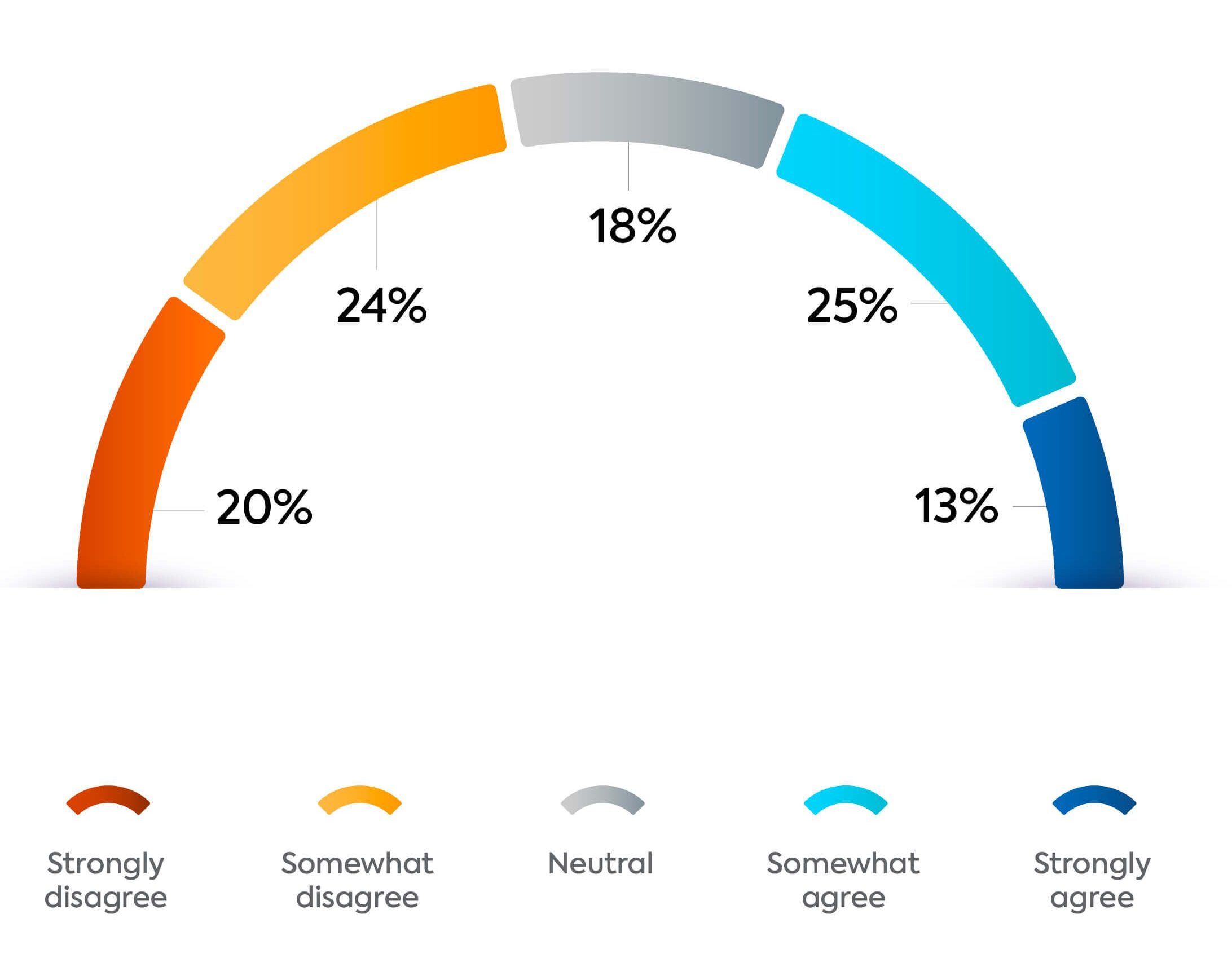
Data analysis spotted that 38% of Gen Z employees are dependent on AI to complete their daily tasks at work. On the upside, 44% are not. Considering Gen Z’s enthusiasm for AI, it’s positive to see they are not hooked on it en masse. Still, seeing over a third of Gen Z employees dependent on AI is a warning light to keep an eye on.
Furthermore, the majority see benefits of smart tech in their day-to-day work: Sixty-eight percent of Gen Z employees find AI helpful with their daily workflow and tasks.
How helpful is AI with
your daily workflow and tasks?
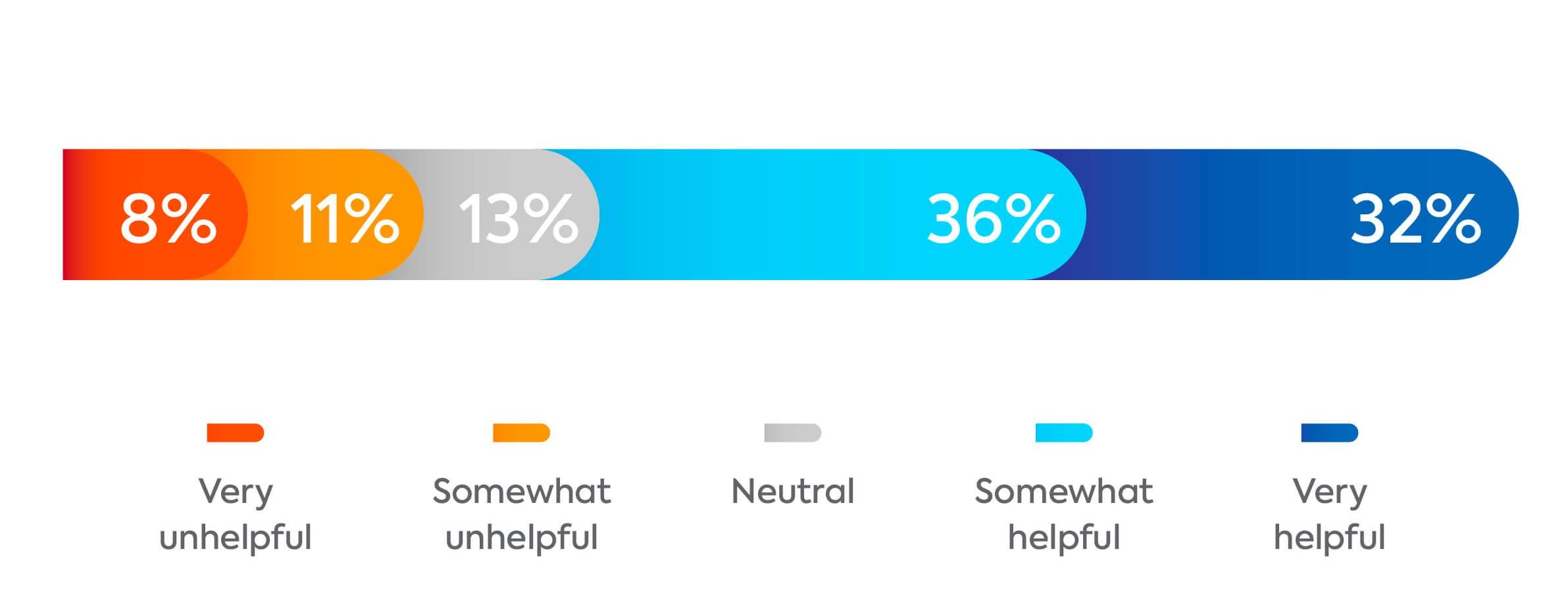
And that’s not all. The list of areas where AI helps young pros goes on:
Decision-making: 59% of Gen Z employees found AI helps improve their decision-making.
Onboarding: 55% of Gen Z employees found AI helpful with onboarding at a new job.
Getting hired: 50% of Gen Z employees found AI helpful with landing a new job.
Bridging gaps: 50% of Gen Z employees found AI helpful with bridging communication gaps with colleagues or other departments.
Final takeaways
Gen Z’s relationship with AI is set to shake up the world of work. The youngest generation, which is taking over the workplace, gravitates toward technology. Putting human interaction on the back burner, as this survey revealed.
The interplay between the up-and-coming generation and artificial intelligence will redefine the workplace.
AI holds great potential for Gen Z. But at the same time, it throws a wrench into their professional development. Especially when it comes to teamwork, communication, and building workplace relationships.
The interplay between the up-and-coming generation and AI will redefine the workplace. To help employers successfully navigate the transition, we have identified five takeaways — critical gaps that the survey data brought to light.
Gen Z and AI: Five critical gaps for the next-gen workplace
Gap 1: Tech assistance vs human mentorship
Gap 2: Critical thinking vs AI-driven insights
Gap 3: Digital fluency vs emotional intelligence
Gap 4: Efficiency vs learning and development opportunities
Gap 5: Overreliance on AI vs cognitive skills
AI has the potential to elevate organizations that foster a strong people-centered culture. In contrast, it may erode the skill sets of those that remain in business-as-usual mode, lulling them to sleep.
Use this data as a wake-up call.









